一般过去时疑问句
一般过去时的用法和结构
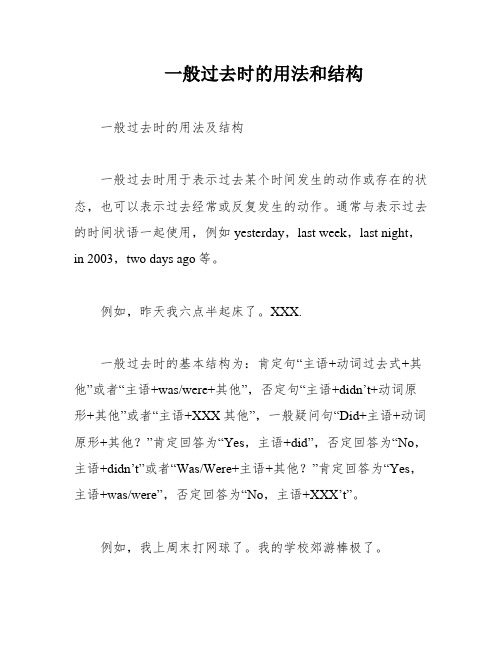
一般过去时的用法和结构一般过去时的用法及结构一般过去时用于表示过去某个时间发生的动作或存在的状态,也可以表示过去经常或反复发生的动作。
通常与表示过去的时间状语一起使用,例如yesterday,last week,last night,in 2003,two days ago等。
例如,昨天我六点半起床了。
XXX.一般过去时的基本结构为:肯定句“主语+动词过去式+其他”或者“主语+was/were+其他”,否定句“主语+didn’t+动词原形+其他”或者“主语+XXX其他”,一般疑问句“Did+主语+动词原形+其他?”肯定回答为“Yes,主语+did”,否定回答为“No,主语+didn’t”或者“Was/Were+主语+其他?”肯定回答为“Yes,主语+was/were”,否定回答为“No,主语+XXX’t”。
例如,我上周末打网球了。
我的学校郊游棒极了。
这个女孩昨天下午没玩电子游戏。
上星期五老XXX不高兴。
特殊疑问句的结构为:特殊疑问词+一般疑问句(顺序)?例如,XXX上周末干什么了?他去看了他的祖父母。
你昨天在哪儿?我在家里。
为了帮助记忆实义动词一般过去时的用法和结构,我们可以使用以下歌诀:“动词一般过去时,表示过去发生事。
谓语动词过去式,过去时间作标志。
否定形式很简单,主语之后加didn't。
谓语动词要还原。
疑问构成有规则,主语前面加did。
”过去式的构成有两种方式:be动词和实义动词。
系动词be的过去式有两种形式:was和were。
其中,was是am和is的过去式,were是are的过去式。
实义动词过去式的构成有以下几种规则:1.一般在动词末尾加-ed,例如walk→walked,play→played;2.以不发音e结尾的动词末尾只加-d,例如love→loved,decide→decided;3.以“辅音字母+y”结尾的动词,先将y变为i,再加-ed,例如study→studied,carry→carried;4.末尾只有一个辅音字母的重读闭音节,先双写该辅音字母,再加-ed,→ped,plan→planned。
牛津英语一般过去时疑问句的语法
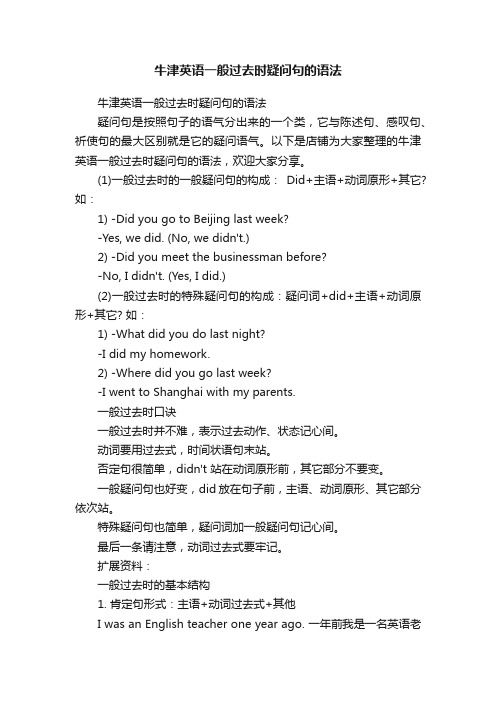
牛津英语一般过去时疑问句的语法牛津英语一般过去时疑问句的语法疑问句是按照句子的语气分出来的一个类,它与陈述句、感叹句、祈使句的最大区别就是它的疑问语气。
以下是店铺为大家整理的牛津英语一般过去时疑问句的语法,欢迎大家分享。
(1)一般过去时的一般疑问句的构成:Did+主语+动词原形+其它? 如:1) -Did you go to Beijing last week?-Yes, we did. (No, we didn't.)2) -Did you meet the businessman before?-No, I didn't. (Yes, I did.)(2)一般过去时的特殊疑问句的构成:疑问词+did+主语+动词原形+其它? 如:1) -What did you do last night?-I did my homework.2) -Where did you go last week?-I went to Shanghai with my parents.一般过去时口诀一般过去时并不难,表示过去动作、状态记心间。
动词要用过去式,时间状语句末站。
否定句很简单,didn't 站在动词原形前,其它部分不要变。
一般疑问句也好变,did放在句子前,主语、动词原形、其它部分依次站。
特殊疑问句也简单,疑问词加一般疑问句记心间。
最后一条请注意,动词过去式要牢记。
扩展资料:一般过去时的基本结构1. 肯定句形式:主语+动词过去式+其他I was an English teacher one year ago. 一年前我是一名英语老师。
I bought a yellow dress yesterday afternoon. 昨天下午我买了一条黄裙子。
2. 否定句形式:①was/were+not; ②在行为动词前加didn't,同时还原行为动词I wasn't an English teacher one year ago. 一年前我不是一名英语老师。
一般过去时特殊疑问句10个例句七年级下册第11单元

一般过去时特殊疑问句10个例句
一般过去时是英语语法中的一种时态,表示过去发生的动作或状态。
在构成特殊疑问句时,需要使用助动词“did”,并将主语放在助动词之前。
例如:
1.What did you do yesterday?(你昨天做了什么?)
2.Where did he go on vacation?(他去哪里度假了?)
3.Did they like the movie?(他们喜欢那部电影吗?)
4.How did she get to the airport?(她怎么去机场的?)
5.When did you start learning English?(你什么时候开始学英语的?)
6.Why did he miss the meeting?(他为什么错过了会议?)
7.Did you have breakfast this morning?(你今天早上吃早餐了吗?)
8.Who did she talk to on the phone?(她和谁打电话了?)
9.How long did it take you to finish the project?(你花了多长时间完成这个项目?)
10.What time did they arrive at the hotel?(他们几点到达酒店的?)
此外,也可以在特殊疑问句中使用“be”动词和“have”动词。
例如:
1.Were you at home last night?
2.Has she ever been to Europe?。
一般过去时的特殊疑问句
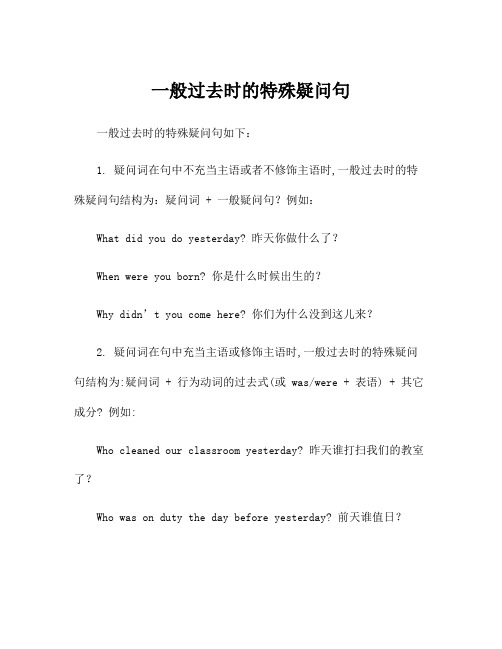
一般过去时的特殊疑问句
一般过去时的特殊疑问句如下:
1. 疑问词在句中不充当主语或者不修饰主语时,一般过去时的特殊疑问句结构为:疑问词 + 一般疑问句?例如:
What did you do yesterday? 昨天你做什么了?
When were you born? 你是什么时候出生的?
Why didn’t you come here? 你们为什么没到这儿来?
2. 疑问词在句中充当主语或修饰主语时,一般过去时的特殊疑问句结构为:疑问词 + 行为动词的过去式(或 was/were + 表语) + 其它成分? 例如:
Who cleaned our classroom yesterday? 昨天谁打扫我们的教室了?
Who was on duty the day before yesterday? 前天谁值日?
Whose father came to see our teacher just now? 刚才谁的父亲来看我们老师了?。
一般过去时一般疑问句结构-解释说明

一般过去时一般疑问句结构-概述说明以及解释1.引言1.1 概述一般过去时是英语中表示过去发生的动作或状态的一种时态,使用一般过去时可以描述过去的事情、习惯、经历等。
在英语中,疑问句是构成语法结构的重要部分,疑问句的构成方式对于我们理解和运用语言至关重要。
本文将重点介绍一般过去时一般疑问句的结构及用法,帮助读者更好地掌握英语语法知识。
通过学习一般过去时的疑问句结构,读者可以更加流利地表达自己的观点、提出问题,同时也能够更好地理解别人的表达方式。
通过对一般过去时一般疑问句的学习,读者将能够在实际交流中更加准确地运用语言,提高沟通能力,为日常生活和工作中的语言运用提供有力的支持。
让我们共同探讨一般过去时一般疑问句的结构和应用,为语言能力的提升添砖加瓦。
1.2 文章结构文章结构部分:本文主要包括引言、正文和结论三个部分。
在引言部分,将对一般过去时一般疑问句结构进行概述,并介绍文章的结构和目的。
在正文部分,将分别对一般过去时的概述、一般过去时一般疑问句的构成和例句分析进行详细阐述。
最后在结论部分,将对一般过去时一般疑问句结构进行总结,并探讨其应用与实践,展望其未来发展方向。
整个文章结构严谨,逻辑清晰,旨在帮助读者全面了解一般过去时一般疑问句的结构和用法。
1.3 目的目的部分的内容应该包括对本篇长文的写作目的和对读者的期望。
在这部分可以阐明为什么选择了这个主题,写作的意义和价值,以及对读者的帮助和启发。
可以强调写作的目的是为了帮助读者更好地理解一般过去时一般疑问句的结构和用法,提高语法知识的理解和应用能力。
同时,也可以对读者的期望进行说明,希望读者能够通过阅读本文,掌握一般过去时一般疑问句的结构,增进对语法知识的理解,提升语言运用能力。
2.正文2.1 一般过去时概述一般过去时是英语中最常用的过去时态之一,用来描述过去发生的事件或状态。
一般过去时表示过去某个时间点或某段时间内发生的动作或状态,通常与表示过去的时间状语连用。
(完整版)一般过去时及特殊疑问句

一般过去时一、一般过去时的简介:定义:表示过去某时发生的动作或存在的状态。
结构:“主语+动词的过去式”用法:1.表示过去某个时间发生的动作或存在的状态。
He was here yesterday.I got up at seven yesterday morning.My mother was at work yesterday afternoon.Did you have a good time last summer?2.表示过去经常或反复发生的动作。
My mother often went to work by taxi last year.When I was a student, I often listened to music.3. 常与一般过去时态连用的时间有:at that time, then, at that moment, yesterday, yesterday morning (afternoon, evening…)last night (week, month, year…),一段时间+ago(several days ago), two days ago, a week ago, three years ago…in 1990, (in 1997…) ,just now, long before, long long ago二. 动词过去式构成规则1、一般在动词原形末尾加–edhelp →helped, look →looked, play →played, work →worked, listen →listened, wash →washed, clean →cleaned,2、结尾是e 的动词加-- dlive---lived hope---hoped use---used like --- liked3、末尾只有一个辅音字母的重读闭音节,先双写这个辅音字母,再加-ed。
一般过去时的否定句和疑问句

一般过去时的否定句和疑问句一般过去时的否定句(Negative Sentences in Simple Past Tense)一般过去时的否定句用于描述过去发生的事情中的否定情况。
构成一般过去时的否定句需要在动词前加上助动词 "did not" 或"didn't",并将动词本身保持原形。
以下是构成一般过去时的否定句的示例:1. 主语 + did not/didn't + 动词原形 + 其他成分- 例如:She did not/didn't go to the party last night.2. 主语 + did not/didn't + 动词原形 + 否定词 + 其他成分- 例如:I didn't see anyone in the park yesterday.需要注意的是,当动词本身为be动词时,不需要再使用助动词 "did"。
直接在be动词前加上 "not" 即可构成否定句。
例如:一般过去时的疑问句(Interrogative Sentences in Simple Past Tense)一般过去时的疑问句用于询问过去发生的事情。
构成一般过去时的疑问句需要将助动词 "did" 放在主语之前,并将动词本身保持原形。
以下是构成一般过去时的疑问句的示例:1. Did + 主语 + 动词原形 + 其他成分?- 例如:Did you study for the test yesterday?2. Did + 主语 + 动词原形 + 否定词 + 其他成分?- 例如:Did she not/didn't watch the movie last night?当动词本身为be动词时,同样需要将助动词 "did" 放在主语之前,形成疑问句。
一般过去时的结构
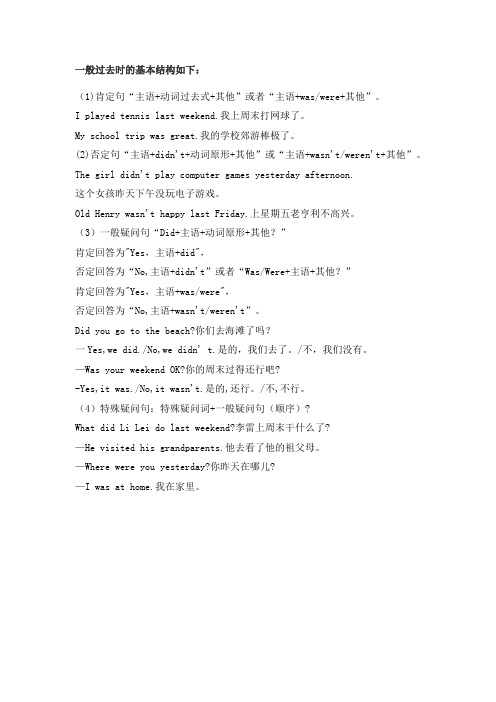
一般过去时的基本结构如下:(1)肯定句“主语+动词过去式+其他”或者“主语+was/were+其他”。
I played tennis last weekend.我上周末打网球了。
My school trip was great.我的学校郊游棒极了。
(2)否定句“主语+didn't+动词原形+其他”或“主语+wasn't/weren't+其他”。
The girl didn't play computer games yesterday afternoon.这个女孩昨天下午没玩电子游戏。
Old Henry wasn't happy last Friday.上星期五老亨利不高兴。
(3)一般疑问句“Did+主语+动词原形+其他?”肯定回答为"Yes,主语+did",否定回答为“No,主语+didn't”或者“Was/Were+主语+其他?”肯定回答为"Yes,主语+was/were",否定回答为“No,主语+wasn't/weren't”。
Did you go to the beach?你们去海滩了吗?一Yes,we did./No,we didn' t.是的,我们去了。
/不,我们没有。
—Was your weekend OK?你的周末过得还行吧?-Yes,it was./No,it wasn't.是的,还行。
/不,不行。
(4)特殊疑问句:特殊疑问词+一般疑问句(顺序)?What did Li Lei do last weekend?李雷上周末干什么了?—He visited his grandparents.他去看了他的祖父母。
—Where were you yesterday?你昨天在哪儿?—I was at home.我在家里。
一般过去时的几种句型

III. 一般过去时的几种句型肯定句结构为:主语+动词的过去式+其它。
如:He went to the toy store yesterday. 他昨天去玩具店了。
否定句结构为:主语+did not (didn't)+动词原形+其它。
如:He didn't go to the toy store yesterday. 他昨天没去玩具店。
一般过去时的一般疑问句的构成:Did+主语+动词原形+其它?如:1) -Did you go to Beijing last week?-Yes, we did. (No, we didn't.)2) -Did you meet the businessman before?-No, I didn't. (Yes, I did.)一般过去时的特殊疑问句的构成:疑问词+did+主语+动词原形+其它?如:1) -What did you do last night?-I did my homework.2) -Where did you go last week?-I went to Shanghai with my parents.一般过去时口诀一般过去时并不难,表示过去动作、状态记心间。
动词要用过去式,时间状语句末站。
否定句很简单,didn't 站在动词原形前,其它部分不要变。
一般疑问句也好变,did放在句子前,主语、动词原形、其它部分依次站。
特殊疑问句也简单,疑问词加一般疑问句记心间。
最后一条请注意,动词过去式要牢记。
初学阶段要掌握的几个动词的过去式:watched TV, washed clothes, played football, cleaned the room, visited grandparents, went to a park, went swimming, read a book, went fishing, went hiking, learned Chinese, sang and danced, took pictures, climbed a mountain, ate good food, bought presents, rowed a boat, saw elephants, went skiing, went ice-skating.I.用所给的动词的适当形式填空。
一般过去时的特殊疑问句

一般过去时
一般过去时表示过去某个时间发生的动作或状态;过去习惯性、经常性的动作、行为; 过去主语所具备的能力和性格等。
一般过去时常常与表示过去的时间状语或从句连用。
例如: yesterday, last weekend, in1993,at that time. once, before, a few days ago, when等表示过去某个时间发生的动作或状态:过去性、经常性的动作、行为。
行为动词的一般过去时
基本结构:主语+动词过去式+ 其他。
否定形式:在行为动词前面加didn’t , 同时还原行为动词。
主语+didn’t +动词过原形+ 其他
一般过去时的一般疑问句
结构是:Did +主语+ do + 其他?
一般过去时的特殊疑问句
结构是:疑问词+ did+主语+动词原形+其他?
be 动词的一般过去时
没有实义动词的句子中使用be 动词。
am, is 的过去式是was;are 的过去式是were 。
结构:肯定句:主语+was/ were + 其他(表语)。
I was happy yesterday.
否定句:主语+was/ were +not+ 其他(表语)。
We weren’t late yesterday.
疑问句:Was/ Were+主语+表语+ 其他。
Were you ill yesterday?
肯定回答:Yes ,I was.
否定回答:No ,I wasn’t.
特殊疑问句:特殊疑问词+was/ were+主语+表语+ 其他。
When were you born?。
初中英语知识点:一般过去时
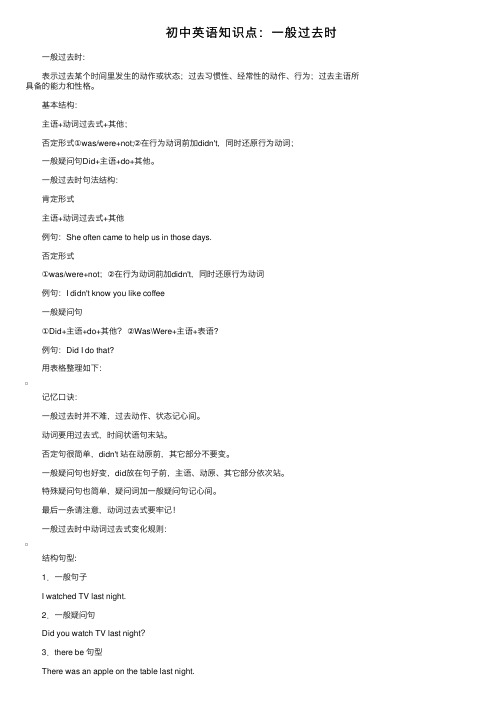
初中英语知识点:⼀般过去时 ⼀般过去时: 表⽰过去某个时间⾥发⽣的动作或状态;过去习惯性、经常性的动作、⾏为;过去主语所具备的能⼒和性格。
基本结构: 主语+动词过去式+其他; 否定形式①was/were+not;②在⾏为动词前加didn't,同时还原⾏为动词; ⼀般疑问句Did+主语+do+其他。
⼀般过去时句法结构: 肯定形式 主语+动词过去式+其他 例句:She often came to help us in those days. 否定形式 ①was/were+not;②在⾏为动词前加didn't,同时还原⾏为动词 例句:I didn't know you like coffee ⼀般疑问句 ①Did+主语+do+其他?②Was\Were+主语+表语? 例句:Did I do that? ⽤表格整理如下: 记忆⼝诀: ⼀般过去时并不难,过去动作、状态记⼼间。
动词要⽤过去式,时间状语句末站。
否定句很简单,didn't 站在动原前,其它部分不要变。
⼀般疑问句也好变,did放在句⼦前,主语、动原、其它部分依次站。
特殊疑问句也简单,疑问词加⼀般疑问句记⼼间。
最后⼀条请注意,动词过去式要牢记! ⼀般过去时中动词过去式变化规则: 结构句型: 1.⼀般句⼦ I watched TV last night. 2.⼀般疑问句 Did you watch TV last night? 3.there be 句型 There was an apple on the table last night. Was there an apple on the table last night ⼀般过去时注意事项: 1.注意主句与从句中时态的⼀致性 如果主句⽤了过去时,从句中⼀般也要⽤过去式,或者过去进⾏时、过去完成时等。
例如: He believed that he was right. 他相信⾃⼰是对的。
新一般过去时的一般疑问句及疑问句

一般过去时的一般疑问句和否定句学号姓名一、含有行为动词的一般疑问句为“Di d…”“Yes, …did”“No, …didn′t”口诀: did 提前动词还原。
一般疑问句的结构为“Did+主语+动词原形+其它?”二、否定句:主语+ didn’t+动词原形+其它练习:将下列句子改成一般疑问句和否定句。
1.The kite flew away.一般疑问句及回答否定句2.We saw many interesting parrots.一般疑问句及回答否定句3.I brought some bread and honey.一般疑问句及回答否定句4.The weather became windy and rainy.一般疑问句及回答否定句5.It rained.一般疑问句及回答否定句6.They went to the park by bike .一般疑问句及回答否定句7.The children could eat their lunch.一般疑问句及回答否定句8.He visited the Palace Museum .一般疑问句及回答否定句9. I caught some fish. 一般疑问句及回答否定句10. They ate a big fish. 一般疑问句及回答否定句一般过去时的特殊疑问句(课堂练习)学号姓名由特殊疑问词引导的问句叫特殊疑问句。
通常句子结构为:特殊疑问词+一般疑问句一般过去时含行为动词的特殊疑问句结构为:特殊疑问词+did+主语+动词原形+其它?练习:对下列句中的划线部分提问。
1.I visited the Shanghai Museum two days ago.the Shanghai Museum two days ago2.Liu Tao went to the Bund for the National Day Holiday.Liu Tao for the National Day Holiday?3.Mike caught a big fish last week.Mike last week4.I called you because I wanted to give the fish.you me5.We picked some oranges and went fishing on the farm.you on the farm6.My holiday was great fun.holiday7.Our family went to a farm near Star Lake.your family8.The boy saw many interesting things in the Museum .the boy in the museum9.Mr Green told the boy a story.the boy a story10.They went to school by bus this morning.they to school this morning11.These are LiuTao’s pencils.are12.My father was 58 years old last year.father last year。
一般过去时的情态动词句型结构

一般过去时的情态动词句型结构
一般过去时的情态动词句型结构如下:
1.肯定句式:主语+情态动词+动词原形+其它。
He could swim when he was five.(他五岁时就会游泳了。
)
2.否定句式:主语+情态动词+not+动词原形+其它。
She couldn't speak English before she came to England.(她来英国之前不会说英语。
)
3.一般疑问句:情态动词+主语+动词原形+其它。
Could you play the piano at the age of six?(你六岁时会弹钢琴吗?)在这些例子中,“could”是一般过去时的情态动词,表示“能够”或“有能力”做某事。
请注意,这些结构中的动词“swim”、“speak”和“play”都是用动词原形,因为情态动词后面要跟动词原形。
希望这些例子能帮助你更好地理解一般过去时的情态动词句型结构。
新一般过去时的一般疑问句及疑问句

新一般过去时的一般疑问句及疑问句集团文件发布号:(9816-UATWW-MWUB-WUNN-INNUL-DQQTY-一般过去时的一般疑问句和否定句学号姓名一、含有行为动词的一般疑问句为“Did…?”“Yes, …did”“No, …didn′t”口诀: did 提前动词还原。
一般疑问句的结构为“Did+主语+动词原形+其它”二、否定句:主语+ didn’t+动词原形+其它练习:将下列句子改成一般疑问句和否定句。
1.The kite flew away. 一般疑问句及回答否定句2.We saw many interesting parrots. 一般疑问句及回答否定句3.I brought some bread and honey. 一般疑问句及回答否定句4.The weather became windy and rainy.一般疑问句及回答否定句5.It rained. 一般疑问句及回答否定句6.They went to the park by bike .一般疑问句及回答否定句7.The children could eat their lunch.一般疑问句及回答否定句8.He visited the Palace Museum .一般疑问句及回答否定句9. I caught some fish. 一般疑问句及回答否定句10. They ate a big fish. 一般疑问句及回答否定句一般过去时的特殊疑问句(课堂练习)学号姓名由特殊疑问词引导的问句叫特殊疑问句。
通常句子结构为:特殊疑问词+一般疑问句一般过去时含行为动词的特殊疑问句结构为:特殊疑问词+did+主语+动词原形+其它练习:对下列句中的划线部分提问。
1.I visited the Shanghai Museum two days ago.the Shanghai Museum two days ago ?2.Liu Tao went to the Bund for the National Day Holiday.Liu Tao for the National Day Holiday3.Mike caught a big fish last week.Mike last week?4.I called you because I wanted to give the fish.you me ?5.We picked some oranges and went fishing on the farm.you on the farm ?6.My holiday was great fun.holiday ?7.Our family went to a farm near Star Lake.your family ?8.The boy saw many interesting things in the Museum .the boy in the museum ?9.Mr Green told the boy a story.the boy a story?10.They went to school by bus this morning.they to school this morning? 11.These are LiuTao’s pencils.are ?12.My father was 58 years old last year.father last year?。
- 1、下载文档前请自行甄别文档内容的完整性,平台不提供额外的编辑、内容补充、找答案等附加服务。
- 2、"仅部分预览"的文档,不可在线预览部分如存在完整性等问题,可反馈申请退款(可完整预览的文档不适用该条件!)。
- 3、如文档侵犯您的权益,请联系客服反馈,我们会尽快为您处理(人工客服工作时间:9:00-18:30)。
Improve communicative skills
I study.I understand.I can
What, Where, …… Do you know others?
Improve communicative skills
I study.I understand.I can
对地点进行提问
I went to Guilin in my summer vacation. Where did you go in your summer vacation?
Improve communicative skills
Improve communicative skills
I study.I understand.I can
一些常用的特殊疑问词及含义 what 什么 when (what time) 什么时候 where 那里 why 为什么 who 谁 whose 谁的 which 哪一个 how 怎样 how many 多少 how much 多少,多少钱 how long 多长 how often 多久一次 how soon 多久以后 how far 多远 how old 多大年纪,几岁
What did he do yesterday?
He played football yesterday.
Improve communicative skills
I study.I understand.I can
What did she do last weekend? Did she…?
Yes, she did. No, she didn’t.
Improve communicative skills
I study.I understand.I can
Let’s Practice!
1. I saw a mouse just now. 一定: what 二变: Did you see what just now? 三提: What did you see just now?
对事、物的提问
I read a book. What did you read? Anny was happy yesterday. 注意:当划线部分是句子的主语时,只要挑选合适 的特殊疑问词,将划线部分代替掉就可以了,不用 Who was happy yesterday? 做其他的任何变化。 主格,只能用亍对人的提问
Improve communicative skills
I study.I understand.I can
She cleaned the house /did the housework last weekend.
Improve communicative skills
I study.I understand.I can
比较精确的时间,几点几分
Improve communicative skills
I study.I understand.I can
询问可数名词数量
Lily ate two eggs yesterday.
How many eggs did Lily eat yesterday?
This dress is 288 yuan. How much is this dress? There is 50 mL water in the bottle. How much water is there in the bottle?
Improve communicative skills
/web2/angelaruizmontero
I study.I understand.I can
可用亍对人、事或物的提问。
I bought the blue T-shirt. Which T-shirt did you buy? The girl in red had a cold last week. Which girl had a cold last week?
I study.I understand.I can
Where was he just now?
Was he …? Yes, he was. No, he wasn’t.
Improve communicative skills
I study.I understand.I can
He was in the classroom just now.
looked 2. live lived 3. stop stopped 4. go went 5. hope hoped 6. trip tripped 7. call called 8. eat ate 9. want wanted 10. are were 1. look
went had did got came said saw put read took
Improve communicative skills
I study.I understand.I can
What did he do yesterday?
Did he …? Yes, he did. No, he didn’t.
Improve communicative skills
I study.I understand.I can
Improve communicative skills
I study.I understand.I can
21.buy 22.sing 23.hear 24.make 25. find 26.break 27.think 28.fall 29.write 30.be
bought sang heard made found broke thought fell wrote was/were
What did he eat for lunch? Did he …? Yes, he did. No, he didn’t.
Improve communicative skills
I study.I understand.I can
He ate noodles for lunch.
Improve communicative skills
询问价钱和不可数名词数量
Improve communicative skills
I study.I understand.I can
对原因进行提问
I was late because my clock didn’t wor cat is 2 months old. How old is the little cat?
2. She 一定: 二变: 三提:
had breakfast at seven o’clock. when Did she have breakfast when? When did she have breakfast?
Improve communicative skills
I study.I understand.I can
I study.I understand.I can
对时间进行提问
Julie got up at 6:30 this morning. When/What time did Julie get up this morning? It is 2:30 now. What time is it now?
Improve communicative skills
I study.I understand.I can
动词过去式变化规律
1、 动词词尾直接加-ed ———————————————————— eg. work—worked finish—finished listen--listened 2. _________________________________________ 以不发音e结尾,动词词尾加-d eg. like—liked live—lived phone--phoned 3.__________________________________________ 以辅音字母加y结尾的动词,把y变成i再加-ed eg. study—studied carry—carried try--tried 4._________________________________________ 闭音节动词,双写词尾字母再加-ed eg. stop—stopped skip—skipped shop--shopped 5._________________________________________ 不规则动词 eg. am—was go—went get—got
特殊疑问词
Improve communicative skills
I study.I understand.I can
Try to complete the dialogue
When ______did you go to Hainan? In my summer vacation. What ______ was the weather like in Hainan at that time? Rose: It was very hot. Where Jack: _____did you stay in Hainan? Rose: In the hotel. Which Jack: _____hotel did you prefer? Rose: We preferred Sanya Hotel. How Jack: _____did you like the food there? Rose: It was great.
